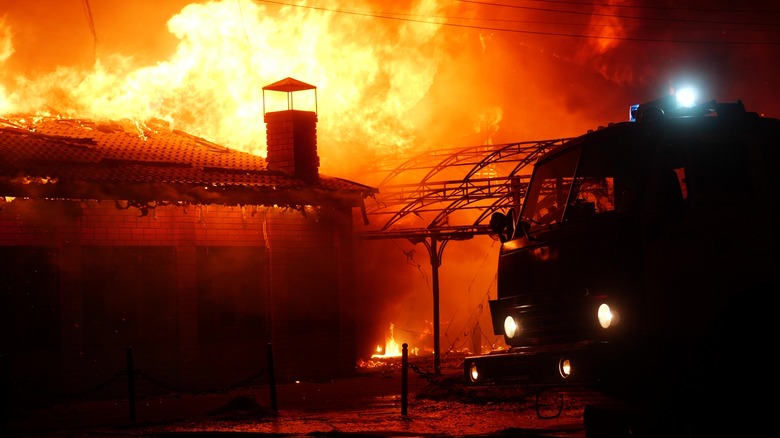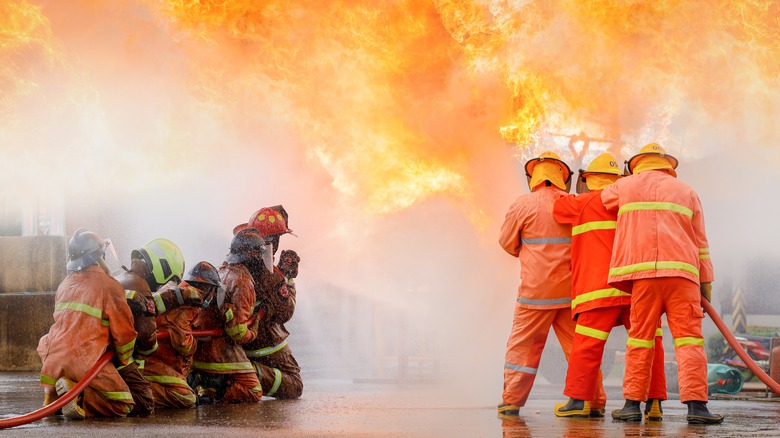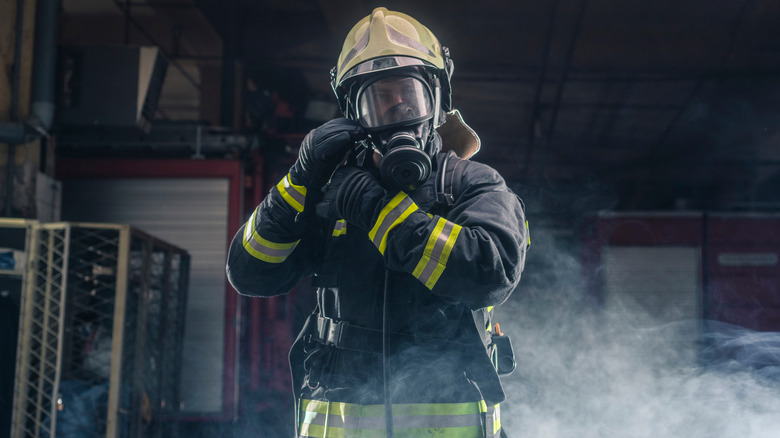What Do The Number Alarms Mean For A Fire?
Fire is, at once, a crucial tool for our survival and a deadly danger to us as well as a wide array of life on Earth. According to J. A.J. Gowlett's study "The discovery of fire by humans: a long and convoluted process" (via The Royal Society Publishing), it's impossible to say exactly when human beings learned to harness the potential of fire and use it at will. "Rather than as an event, the discovery of fire use may be seen as a set of processes happening over the long term," the author argues, stating that early humans may have simply taken advantage of (and sheltered from) naturally occurring fires, rather than those they themselves set, before developing such abilities.
Whenever it happened, though, many thousands of years later, we've taken advantage of this awesome force for heat and light, with creations from scented candles to barbecues, and even steam trains. Accidental fires and wildfires can be utterly devastating, though, and this certainly isn't a force to be taken for granted. Perhaps you're familiar with the numbered alarm system for fires — each designates a specific set of circumstances involving a blaze.
The higher the alarm, the more firefighters needed
The World Health Organization highlights the tremendous damage caused by wildfires around the world. According to the organization, between 1998 and 2017, around 2,400 people were killed globally by fires and volcanoes. Wildfires are made all the more dangerous by their unpredictability; around half of them can't be traced to a particular source. On top of this, the heating of the planet and resultant drier landscapes only heighten the risk.
You may have heard of five alarm chili, touted by chefs and restaurants boasting of their dish's heat. This, of course, is a reference to the alarm system by which fires are rated. This system, it seems, corresponds to the number of personnel required to respond to an outbreak.
The Louisville Fire Department, per The Courier-Journal, deems a one-alarm fire (also referred to as a box alarm) a blaze to which 22 staff must be dispatched: two members of command staff and five teams of four personnel. For a two-alarm fire, 44 personnel are needed. A three-alarm fire is attended by 66 staff (six of which are command members), a four-alarm would demand 88 staff (eight of them being command), and a five-alarm fire necessitates 110 firefighters (10 being command staff). Twelve command staff and 120 firefighters are needed to tackle a six-alarm fire, a truly devastating inferno.
Fires as deadly as five-alarm, and beyond
The Courier-Journal also points out, however, that this isn't the only way to define the different alarms. New York City's fire department, according to The Explainer (via Slate), tackles two-alarm fires with 106 personnel, and up to 198 for a five-alarm fire. The official website for Rochester, New Hampshire, meanwhile, explains that their fire department rates blazes up to five alarms. Such fires require a lot of outside support, to ensure that there are enough firefighters to tackle it while ensuring that fire stations are still covered. Here, a smaller house fire or the like would be deemed a one- or two-alarm, reportedly, while "a large-scale fire in a commercial building would require three alarms or more."
Invention & Technology Magazine reports that Boston installed the first call box alarm system (for locating fires quickly) in April 1852. Today's numbered alarm system for fires seems to harken back to this innovation. Different fire departments define one-alarm to five-alarm (and beyond, where applicable) in different ways, but they're a quick and simple way to quickly ascertain how serious a given breakout is and can be raised or lowered as a situation unfolds.
In January 2022, per the United Nations, the body's secretary-general, António Guterres, declared that COVID-19, climate change and other difficult global conditions combined to create "a five-alarm global fire that requires the full mobilization of all countries." There's no need to get persnickety about how a five-alarm fire is defined to understand his point.


